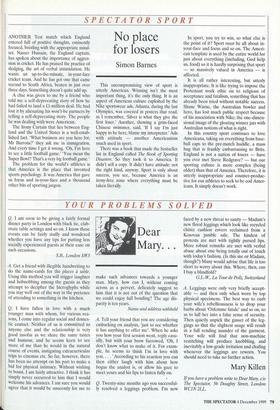SPECTATOR SPORT
No place for losers
Simon Barnes
ANOTHER Test match which England entered full of positive thoughts, eminently focused, bristling with the appropriate mind- set. Nasser Hussain, the England captain, has spoken about the importance of aggres- sion in cricket. He has praised the practice of sledging, the art of verbal intimidation. He wants an up-to-the-minute, in-your-face cricket team. And he has got one that came second to South Africa, beaten in just over three days. Something doesn't quite add up. A clue was given to me by a friend who told me a self-deprecating story of how he had failed to land a £1-million deal. He had lost it by alienating his won't-be partners by telling a self-deprecating story. The people he was dealing with were American.
The Irony Curtain that lies between Eng- land and the United States is a well-estab- lished fact. 'What business are you here for, Mr Barron?' they ask me in immigration. And every time I get it wrong. 'Oh, I'm here to see a little football game."You mean the Super Bowl? That's a very big football game.' The problem for the world's athletes is that America is the place that invented sports psychology. It was America that gave us focus and in-your-face and a thousand other bits of sporting jargon.
This uncompromising view of sport is utterly American. Winning isn't the most important thing, it's the only thing. It is an aspect of American culture exploited by the Nike sportswear ads. Atlanta, during the last Olympics, was covered in posters that read, as I remember, 'Silver is what they give the first loser.' Another, showing a grim-faced Chinese swimmer, said, 'If I say I'm just happy to be here, blame my interpreter.' Ads with attitude — another Americanism much used in sport.
There was a book that made the bestseller list in England called The Book of Sporting Disasters. So they took it to America. It didn't sell a copy. It didn't have attitude: not the right kind, anyway. Sport is only about success, you see, because America is an irony-free zone where everything must be taken literally. In sport, you try to win, so what else is the point of it? Sport must be all about in- your-face and focus and so on. The Ameri- can template is used by the entire world for just about everything (including, God help us, food) so it is hardly surprising that sport — so massively valued in America — is affected.
It is all rather interesting, but utterly inappropriate. It is like trying to impose the Protestant work ethic on to religions of acceptance and fatalism, something that has already been tried without notable success. Shane Warne, the Australian bowler and hero, has lost much public respect because of his association with Nike; the one-dimen- sional image of the gloating winner jars with Australian notions of what is right.
In this country sport continues to love Americana, taking on everything from base- ball caps to the pre-match huddle, a mass hug that is frankly embarrassing to Brits. England is not a nation of losers — have you ever met Steve Redgrave? — but our sporting culture is more complex (being older) than that of America. Therefore, it is utterly inappropriate and counter-produc- tive for our athletes to seek to be cod Amer- icans. It simply doesn't work.


















































































 Previous page
Previous page